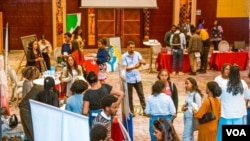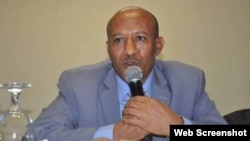Ethiopia
UN chief says DR Congo escalation must be avoided 'at all costs' on African Union visit
UN Secretary-General Antonio Guterres stressed on Saturday that regional escalations of the conflict in Congo "must be avoided at all costs." "The Congolese people have been suffering yet again from a brutal cycle of violence and the fighting that is raging in South Kivu, as a result of the continuation of the M23 offensive, threatens to push the entire region over the precipice," he warned as he addressed leaders at the African Union summit in Ethiopia. "There is no military solution. The deadlock must end, the dialogue must begin, and the sovereignty and territorial integrity of the DRC must be respected."
Analysis: What's causing increased seismic activity in Ethiopia's Rift Valley?
In the last few weeks, at least 10 earthquakes have been recorded in Ethiopia’s Rift Valley, the strongest measuring 5.8 magnitude, affecting areas including the capital, Addis Ababa. VOA has reported the evacuation of approximately 80,000 residents from the country’s Afar, Oromia and Amhara regions. Cynthia Ebinger is an American geoscientist at Tulane University known for her research on continental rifts and the movement of continental plates; her disciplines include seismology, tectonics, crustal dynamics and imaging for archaeology and geosciences. In explaining the root cause of the earthquakes to VOA’s Yeheyes Wuhib she says Rift Valley is one of the world’s most seismically active regions.
Somalia-Ethiopia tensions threaten Turkey’s bid to spread its influence
Turkey is deepening its cooperation with Somalia, this month sending a research ship to look for energy resources. But as Dorian Jones reports from Istanbul, tensions between Somalia and Ethiopia are threatening Ankara’s ambitions in the Horn of Africa region.
South Sudan’s students fear tremor
South Sudanese students in Ethiopia say they are safe after a 4.9-magnitude earthquake felt across the Ethiopian Rift Valley Sunday and in several areas of the country, including Addis Ababa, sending some residents running for shelter. Denis Logonyi has more from Juba.
Turkey boosts Africa influence with Ethiopia-Somalia mediation role
Turkey has been mediating between Ethiopia and Somalia, which are locked in a dispute, mainly over sea access for Ethiopia. At issue is a deal that Ethiopia signed earlier this year with the self-proclaimed, breakaway region of Somaliland. Ankara’s mediation efforts are seen as underlying its growing influence in the strategic Horn of Africa region. Dorian Jones reports from Istanbul.
Ethiopia families mourn, search for deadly landslide victims
Families of landslide victims in Ethiopia's Gofa region grieved on Sunday while search operations continued. "We’ve lost a lot. There are now very few of us who are alive,” said landslide survivor Selamnesh Sewrawit.
Online abuse silences women in Ethiopia, study finds

ADDID ABABA — Research into online abuse and hate speech reveals most women in Ethiopia face gender-targeted attacks across Facebook, Telegram and X.
The abuse and hate speech are prompting many Ethiopian women to withdraw from public life, online and off, according to the recent research.
The Center for Information Resilience, a U.K.-based nonprofit organization, spearheaded the study. The CIR report, released Wednesday, says that women in Ethiopia are on the receiving end of abuse and hate speech across all three social media platforms, with Facebook cited as the worst.
Over 2,000 inflammatory keywords were found in the research, which looked at three Ethiopian languages — Amharic, Afan Oromo and Tigrigna — as well as English. The list is the most comprehensive inflammatory word lexicon in Ethiopia, according to the researchers.
Over 78% of the women interviewed reported feelings of fear or anxiety after experiencing online abuse.
It is highly likely similar problems exist in areas of society that have not been analyzed yet, said Felicity Mulford, editor and researcher at CIR.
“This data can be used by human rights advocates, women’s rights advocates, in their advocacy,” she said. “We believe that it’s incredibly impactful, because even though we’ve only got four languages, it shows some of the [trends] that exist across Ethiopia.”
Online abuse is so widespread in Ethiopia that it has been “normalized to the point of invisibility,” the report’s authors said.
Betelehem Akalework, co-founder of Setaset Power, an Afro-feminist movement in Ethiopia, said her work has opened doors to more-serious, targeted attacks.
“We [were] mentally prepared for it to some extent,” she said. “We [weren’t] surprised that the backlash was that heavy, but then we did not anticipate the gravity of that backlash. So, we took media training, and we took digital security trainings.”
The Ethiopian Human Rights Defenders Center, established three years ago, offers protection for human rights defenders and social media activists in the country.
The center’s program coordinator, Kalkidan Tesfaye, said there must be more initiative from the government in education and policymaking to help women protect themselves from online abuse.
“In our recommendation earlier, we were talking about how the Ministry of Education can incorporate digital safety training ... a very essential element to learning about computers or acquiring digital skills,” Tesfaye said.
The researchers also investigated other protected characteristics under Ethiopian law, including ethnicity, religion and race. The findings showed that women face compounded attacks, as they are also often targeted for their ethnicity and religion.
Committee to Protect Journalists calls for Ethiopian journalist prison release
Clashes displace over 50,000 in northern Ethiopia

NAIROBI—Over 50,000 people have been displaced by clashes in a disputed area in northern Ethiopia, the United Nations said, as the international community expressed concern about the violence involving fighters from rival regions.
"The humanitarian situation is dire, with thousands of women and children in need of broad humanitarian support to survive," the U.N. said late Monday, citing local authorities in the disputed area, which is claimed by Tigray and neighboring Amhara.
The global human rights body noted the number of people displaced by the armed clashes in Alamata Town and Raya Alamata, Zata and Ofla since the weekend has passed 50,000.
Amhara forces occupied Raya Alamata in southern Tigray during a two-year war between Ethiopia's government and regional Tigrayan authorities.
Under a peace deal between Prime Minister Abiy Ahmed's government and Tigrayan authorities, Amhara forces — which backed federal troops during the conflict — were due to withdraw from Raya Alamata after the agreement was signed in Pretoria in November 2022.
Neither the federal government nor Tigrayan authorities responded to AFP requests for information and the identity of the fighters involved remains unclear. It is impossible to verify the situation on the ground independently as media access to northern Ethiopia is heavily restricted.
Reports of the fighting have sparked alarm among the international community, with the embassies of several nations including the United States, Japan, Britain and France on Saturday calling for dialogue and urging the "de-escalation and protection of civilians."
The Amhara regional administration last week accused the Tigray People's Liberation Front party, which controls Tigray, of "invading" Raya Alamata and other areas "which have identity questions."
"The Amhara region administration asks TPLF and its supporters to... fully adhere to the Pretoria agreement and hence to swiftly vacate from the areas it currently controls," it said in a statement issued last Wednesday.
"If this doesn't happen the Amhara region administration will be forced... to protect our people from attack and save the country from destruction."
Getachew Reda, a senior TPLF member who heads the Tigray regional administration, said on X last week that the recent developments were "the work of diehard enemies of the Pretoria agreement trying to take advantage of real or perceived differences to derail" the peace deal.
IMF Mission Visits Ethiopia

ADDIS ABABA — An International Monetary Fund staff mission is in Ethiopia, a senior finance ministry official said on Thursday, as the nation faces a deadline with major creditor countries to secure a loan from the international lender.
Last month, IMF spokesperson Julie Kozack had said the fund would send a mission to the Horn of Africa nation to discuss its request for a loan program.
Ethiopia is in talks with IMF to borrow around $3.5 billion under a reform program, three sources familiar with the matter said in December.
The IMF confirmed the presence of the staff mission in Ethiopia’s capital, Addis Ababa.
"An IMF mission is starting discussions with the government of Ethiopia this week to continue the constructive dialogue held to date on supporting Ethiopia’s economic reform," said a spokesperson for the fund.
In December, the Paris Club of developed creditor nations said Ethiopia's agreement with its bilateral creditors, other than China, to suspend debt payments until 2025 could be voided if the country does not secure an IMF loan by March 31, 2024.
In the same month, Ethiopia became the third African nation to default in as many years after it failed to make a payment on its $1 billion Eurobond.
Turkey Faces Balancing Act With Somalia, Ethiopia After Naval Deal
Turkey's new naval agreement with Somalia places its navy in a strategically vital region, underlining Ankara's growing naval ambitions. However, analysts warn that the agreement threatens to escalate current tensions with Somalia’s neighbor Ethiopia, which recently signed a port deal with a breakaway region on Somalia, Somaliland. Dorian Jones reports from Istanbul.
Ethiopia Approves Intelligence Head as Deputy Prime Minister

ADDIS ABABA — Ethiopia's parliament on Thursday approved the appointment of intelligence service chief Temesgen Tiruneh as deputy prime minister, replacing Demeke Mekonnen, who had served in the role for 11 years, state-run media reported.
In addition, parliament accepted the nomination of Taye Atske Selassie, a former ambassador to the United Nations, as foreign minister.
Temesgen, who has coordinated the government's response to a conflict that broke out last year in the Amhara region, was elected in late January to succeed Demeke as a vice president of the ruling Prosperity Party.
A vice president of the party typically serves as deputy prime minister.
Demeke had also served as foreign minister since 2020.
The former vice president has been a face of continuity during a turbulent period in Ethiopian politics. He was appointed deputy prime minister after the death of longtime prime minister Meles Zenawi in 2012 and survived a reorganization of the ruling party after Prime Minister Abiy Ahmed came to power in 2018.
Abiy appointed Demeke as foreign minister days after civil war broke out in November 2020 in the northern Tigray region. The conflict lasted two years and killed tens of thousands of people.
Mekdes Daba, a former World Health Organization official, has also been appointed to replace Lia Tadesse as health minister, the Ethiopian Broadcasting Corporation said.
Forum